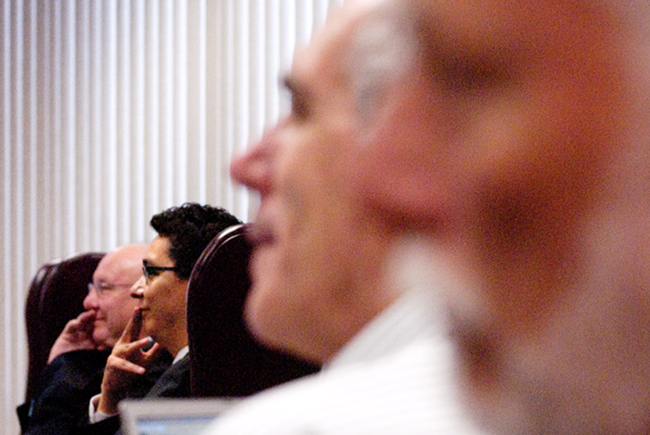Correction: An earlier version of this column misstated that Nizam Al-Mulk was depicted in a textbook as the leading terrorist of his age, where it should have read that his killer, one of Hasan Al-Sabah's followers, was depicted in the textbook as one of the leading terrorists of his age. We have made the change below.
Editor’s Note: On Tuesday, the Texas Board of Education heard testimony from a number of educators who voiced objection to a proposed set of history textbooks. Over the summer, a number of history graduate students from UT participated in a review of these textbooks and found them severely lacking in many areas. Below, we have printed the thoughts of one of those reviewers; to view the opposing viewpoint of one of our columnists, click here. This is part of our weekly Point/Counterpoint series.
Nizam Al-Mulk was born in 1018 CE, in a small village near the Persian city of Tus.. Under the Seljuk empire he rose to a position of immense power. As vizier and the empire’s de facto ruler, Al-Mulk organized fiefdoms, built a multiethnic army, and pushed the Seljuk’s sphere of influence all the way to the Mediterranean. In between, he found time to write a celebrated treatise on government and to found schools of great learning. He was a Sunni statesman, one of the most effective in world history, until he was killed in 1092, possibly by the Ismail sect of Hasan al-Sabah, the “Hashshashin,” from whose name he we get ‘assassins.’ In other words, his life and death was emphatically one of the eleventh century, and spoke to the issues of his day.
But that’s not the impression Texas high school students will get if the State Board of Education (SBOE) recommends a world history textbook submitted by one respected educational publishing company. Instead, they might learn—as I did, when I reviewed the teacher’s edition in June—that Nizam Al-Mulk was “probably” killed by one of al-Sabah’s followers, “the leading terrorist of his age.”
My jaw dropped. This wasn’t just an error of emphasis — it was just plain wrong, a politicized, ahistorical regression through time of a concept, ‘terrorism,’ that responsible historians trace back to the late 18th century at the earliest.
Nor was it an isolated mistake. This week the SBOE held public hearings on a raft of history, geography and government textbooks submitted by publishers to meet the social studies curriculum standards approved in 2010. Those standards, the Texas Essential Knowledge and Skills, or TEKS, have been highly controversial, characterized by the conservative Thomas B. Fordham Institute as a “politicized distortion of history” filled with “misrepresentations at every turn.” These misrepresentations were caused by the ideologues that controlled the SBOE in 2010, which passed an additional resolution warning publishers not to submit textbooks “biased” in favor of Islam.
The publishers got the message and then some. This summer the Texas Freedom Network coordinated a team of Texas historians and doctoral candidates in history at UT Austin, like myself, to review 43 of the books under submission. We found that, in attempting to comply with Texas’ biased, jumbled standards, publishers have submitted texts that will leave our students confused and wrongheaded about history.
Some of those notions are unsurprising to those of us who followed the SBOE’s debate over creationism and high school science textbooks. The U.S. history and government textbooks under review, for example, proved particularly susceptible to the TEKS that exaggerate Judeo-Christian influence on America’s founding and diminish the well-established constitutional concept of the separation of church and state.
Other texts imply that the so-called ‘culture war’ can be settled by including non-Eurasian actors but not their history. For every seven chapters that the publisher of the same world history textbook gave Europe and Asia, Africa and Latin America got two, which were then peppered with generalizations and errors as absurd as that of al-Mulk: the Incas, who governed a highly-organized empire of agriculturalists and artisans, were apparently a “welfare state.”
Calling them one, though, reflects the publishers’ failure to challenge the TEKS’ anti-tax, anti-regulation, free enterprise agenda. It shouldn’t be too much to ask that textbooks portray one of world history’s central lessons: that in the 18th and 19th centuries, expansions in democratic ideals and free labor in Europe and America were linked to the expansion of un-free labor and colonialism elsewhere in the world. Students should also learn how the U.S. government has historically regulated the economy and protected the rights of workers. They should not learn that an expansion of trade in serf-filled Medieval Europe meant that a “spirit of free enterprise reigned.”
Fortunately, it’s not too late for Texas and America’s other states, whose textbook options are deeply affected by the buying power of our educational system. It behooves Texans who care about the past, told accurately and well, to follow the SBOE’s public hearings and to sign the TFN’s call for accurate textbooks and improved TEKS for Texas students. Our history, and their future, hang in the balance.
Heaney is a Harrington Doctoral Fellow in the Department of History.





















